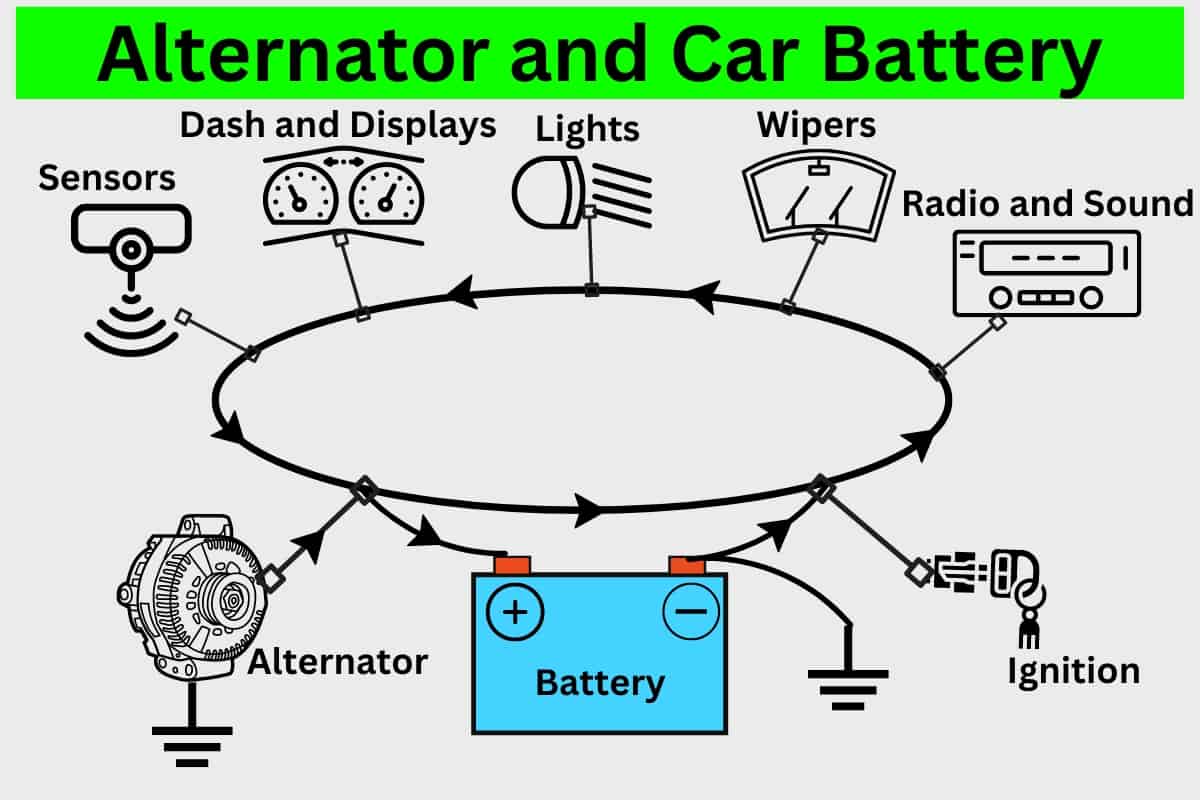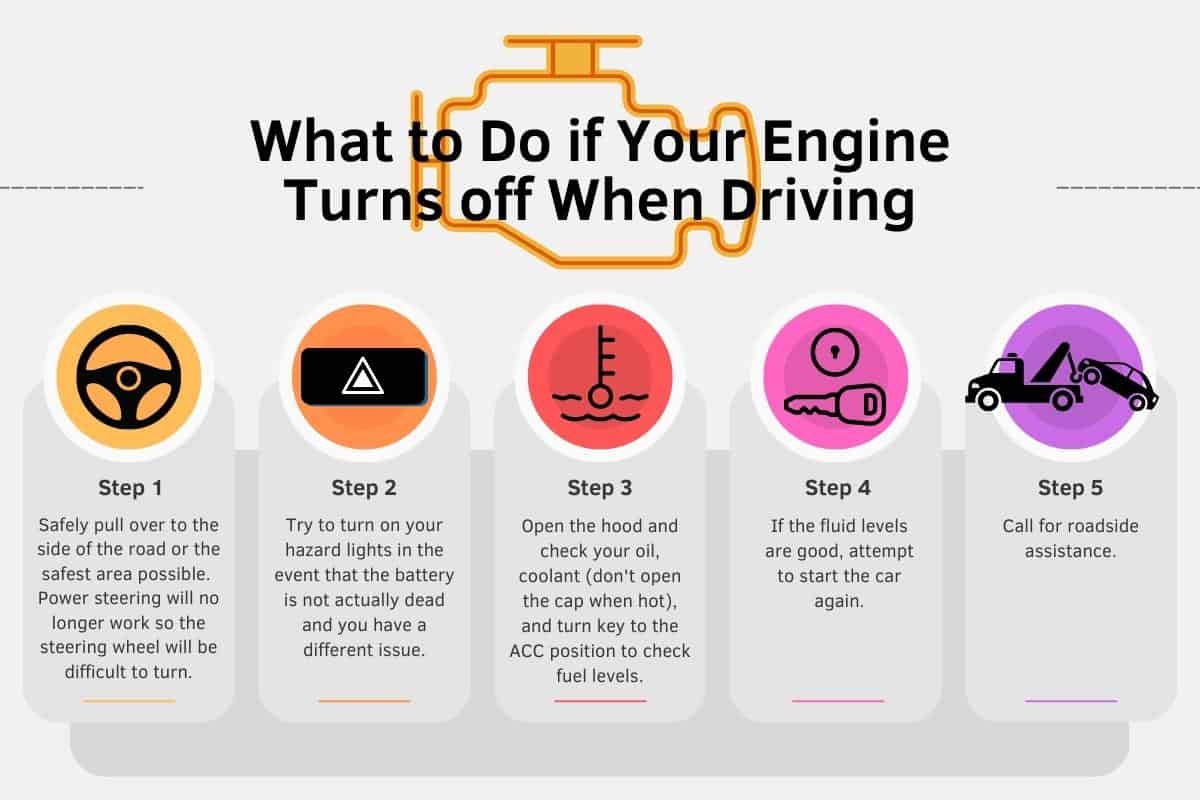We’re all aware of the inconveniences of a flat tire or running out of gas when driving, but is it possible for the battery to die while on the road?
Unfortunately yes, it’s very possible, but thankfully it’s not very common.
If a car’s starter battery dies while driving, it’s generally due to a faulty alternator or an electrical malfunction somewhere in the charging system. When the battery is not being charged, it will continue to power the vehicle for a short time. This amount of time is advertised as the “reserve capacity” on the battery’s sticker and will typically fall between 90 and 120 minutes.
Can Your Car Battery Die While the Engine is On?
When you turn the key in the ignition, a large amount of current is drawn from your car’s starter battery to power up all of your car’s electronics, sensors, and to crank over your engine (by powering the starter).
Once the engine has turned over, the electronics become powered by the car’s alternator. As the engine cycles, the serpentine belt spins and dictates how much electricity should be produced by the alternator.
The alternator then charges up the car’s starter battery after it turns over the engine, and supplies all of your sensors and electronics on board with power.

Any car made in the last 30 years is riddled with electronics and sensors which must be in working order for the car to perform as expected.
If the alternator is malfunctioning, or if the serpentine belt is not adjusted properly, then it is certainly possible for the car battery to die while driving since all of the electronics and sensors onboard will get their electricity from the battery in lieu of the alternator.
You may get about 90 to 120 minutes of driving while only using the battery, but once it drains to empty, your car will power off since the sensors on board will force the engine to shut off.
What Causes a Car Battery to Drain While Driving?
Generally, a car battery will drain while driving if the alternator is malfunctioning, the serpentine belt is not adjusted properly, or if there is a corroded or loose connection at the battery terminals.
As we mentioned in the previous section, the car battery is responsible for starting the car’s engine and initially powering up all of the electronics and sensors. However, once that’s done, the alternator takes over for powering the vehicle’s electronics and sensors and also recharges the battery.
If there is a sudden demand for more electricity than the alternator is currently producing, then the battery will supply the excess. That’s why it’s important to have terminals that are not corroded or loose. If the battery cannot reliably supply any excess electricity, then the sensors on board will fail to communicate with the computer systems and the engine will turn off to prevent any damage.
What Happens if Your Car Battery Dies While Driving?
If there is an issue with your car’s battery not charging then you should see the battery indicator on your panel light up.
Once the alternator or any other part of the charging system fails, your car will run on battery power until there is no more electricity to power the numerous sensors on board. Once these sensors lose power, the car will turn itself off to avoid any engine damage since the computers on board can’t communicate with the sensors and can no longer tell if the engine is running properly.

A typical car starting battery will give you 90-120 minutes of time (reserve capacity minutes) until you will lose power and engine function.
If your car battery does die and your engine shuts off when driving, you will lose some of the driving luxuries that you’re used to like power steering, so be aware of that and don’t panic.
Take the following steps if your engine turns off suddenly while driving:
- Pull over your car safely to the shoulder of the road
- Attempt to turn on your hazard lights (In case it’s a problem other than the battery)
- Check your fuel levels and temperature gauges
- Attempt to start your car again
- Call for roadside assistance and take note of whether your car stalled while at idle or when in motion
You should still attempt to turn on your hazard lights because you won’t know initially if your battery is indeed the problem or not. It could be one of hundreds of reasons why your engine turned off when driving.
Obviously, if you run out of fuel your car will not start and will not keep running. You should also check your coolant levels to make sure your car isn’t overheating.
If your car stalls when you come to a stop light, it could be due to the car not cooling properly. A car in motion will cool itself as the air passes through the radiator coils, but when you come to a stop that cooling effect ceases and a sensor might indicate that your engine is overheating and turn off the engine.
If your car stalled while driving but starts up again without an issue, make sure to check your battery terminal connections for corrosion and to make sure they’re tight.
Yes, the alternator supplies power to your car’s sensors and electronics as the car is driving, but the battery terminal connections are still the intermediary in that circuit since they also provide electricity if there is a demand above what the alternator is producing. If they are loose or corroded, a simple bump on the road might disrupt that circuit and cause the car to stall. The car might start right back up and run just fine for miles until you hit another bump.
